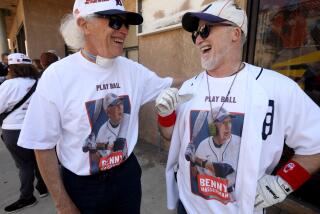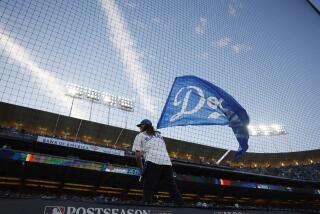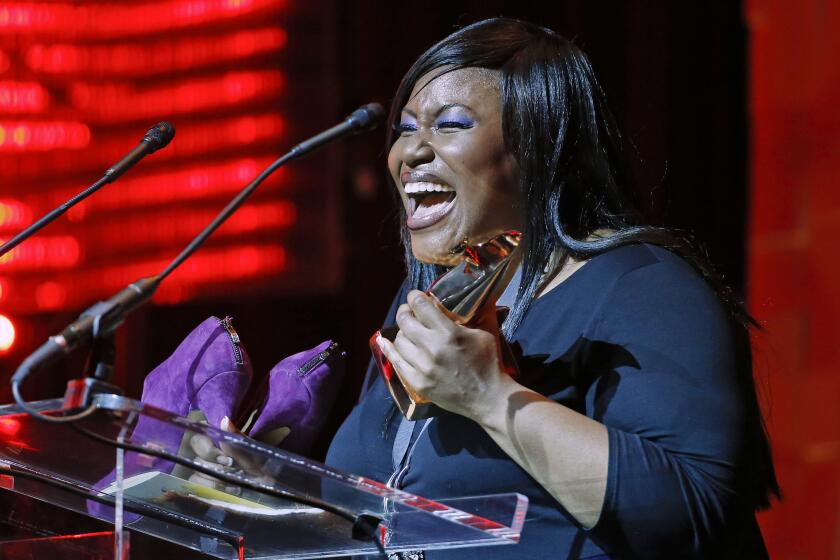Book review: ‘An Improbable Life’ by Jim Abbott and Tim Brown
Imperfect
An Improbable Life
Jim Abbott and Tim Brown
Ballantine: 288 pp., $26
Like so many young men, Jim Abbott grew up wanting to fit in with everybody else while simultaneously wishing to be celebrated for being uncommonly adept at something/anything. In Abbott’s case, he was adept at baseball, a game difficult enough with two hands. Abbott was born with just one. This is his story, of dreaming of being twice as good with half the tools.
If this whole notion seems a little pat, give Abbott a chance. For the former Angel’s new book, “Imperfect,” is an uncommonly compelling coming-of-age story and as American as brick dust. In an era of crooks and thugs, this very human memoir may do for baseball what “The Blind Side” did for football’s big-lug linemen.
Abbott’s back story: He was born without a right hand to struggling young parents who had the good sense to love him but not coddle him. His father, who had an impressive high school sports career of his own, repeatedly spun the boy around and pushed him back to playgrounds full of taunting schoolmates.
It was on those playgrounds that Abbott would prove himself just as able — and often more capable — than the others. A screaming “cut” fastball and prodigious poise would make him a prep sensation and then an All-American at the University of Michigan.
The story of his life, from sandlot oddity to gold-medal Olympian to Major League sensation after being drafted by the Angels, is told against the backdrop of a no-hitter Abbott threw for the Yankees in 1993. Details of his upbringing and ensuing career are sandwiched between chapters on the Yankee Stadium triumph.
This is not the first time such a device has been used. Few things in life build with the ghostly drama of a no-hitter, the fans and teammates rallying around the Man of the Moment, each pitch more important than the last.
But what really elevates “Imperfect” is Abbott’s realization, once he turns pro, of the impact he is having off the field. That missing hand — the thing that tormented him as a child, the thing he tucked in a pocket so that he looked like everyone else — becomes part of his arsenal as well. As Abbott’s star rises, so does his role as champion to disabled youngsters.
“I didn’t see them coming, not in the numbers they did,” he writes. “They were shy and beautiful, and they were loud and funny, and they were, like me, somehow imperfectly built. And, like me, they had parents nearby, parents who willed themselves to believe that this accident of circumstance or nature was not a life sentence, and that the spirits inside these tiny bodies were greater than the sums of their hands and feet.”
Where this book really sings is in these moments, when the kids think Abbott is inspiring them when it is often the other way around, all of it deftly handled by co-writer Brown, whose storytelling skills are evident throughout.
Abbott’s eventual career slide, which takes him to New York, Chicago and Milwaukee and last-ditch minor league stints in Winston-Salem, N.C., and Birmingham, Ala., is also chronicled here.
In reverse of a no-hitter, where success builds, each failure of a declining player seems to beget another failure. Free of major injury, Abbott sees his fastball desert him, and it is as if the strapping pitcher has been cursed all over again. Did too many cutters take their toll on his arm? Did too much time in the weight room rob it of its natural snap?
No one knows. As Abbott realizes, the hitters’ bats will inform you when it’s time to go, and they did.
Baseball junkies will take delight in Abbott’s reaction to George Steinbrenner’s claim that, while with the Yankees, Abbott hurt his performance by spending too much time visiting kids. Abbott scoffs at the notion, noting that those interactions were primarily done on days when he wasn’t pitching.
There is also some good inside-baseball stuff on Abbott’s super agent, Scott Boras. Abbott, who is unfailingly appreciative to all those who helped him along his journey, has a more bittersweet opinion of the in-your-grill agent.
Dodgers Manager Don Mattingly is in here a bit, as the Yankees’ rock-solid first baseman during the no-hitter, and Angels’ PR guru Tim Mead gets plenty of props as the conduit between Abbott and the youngsters who needed him.
Also coming in for praise is sports psychologist Harvey Dorfman, who has no patience for Abbott when he slips into moments of self-pity toward the end of his career.
“The game can be moody,” Abbott writes. “It is cool and then comforting, warm and then entirely unjust. For no apparent reason, it began to like me again. There was no explanation, and I didn’t ask for one.”
Life is full of curveballs, in baseball and out. Life is challenging enough when you seem to have all the tools. Abbott reminds us that no one really has all the tools, or all the breaks. And this bighearted memoir makes a winning argument that the only way to handle misfortune, as writer Cormac McCarthy is fond of noting, is to treat it as the peculiar and propelling gift it can be.
twitter.com/erskinetimes
More to Read
The biggest entertainment stories
Get our big stories about Hollywood, film, television, music, arts, culture and more right in your inbox as soon as they publish.
You may occasionally receive promotional content from the Los Angeles Times.







